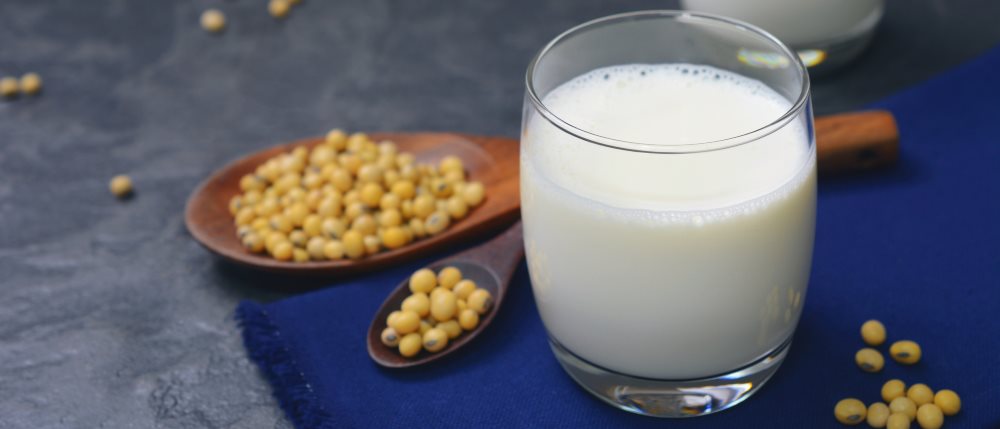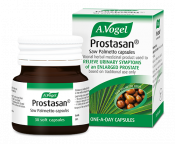Why are people concerned about men drinking soya milk?
Soya milk is a tasty and easily available alternative to dairy products, so it’s popular among people on a dairy-free diet. However, soya contains chemicals called soya isoflavones which are a source of phytoestrogens, and these have oestrogenic effects on the body – which is why we include soya isoflavones in our Menopause Support tablets.
For men, this has become a big concern, with some claiming that the phytoestrogens found in soya isoflavones can have feminising effects on men, such as breast enlargement and emotional changes, as well as cause problems such as erectile dysfunction, low sperm function and reduced libido.
On the flip-side, many people on dairy-free and vegan diets thrive on soya milk and other soya products with no adverse effects. Karris McCulloch at TheVeganKind claims 'Soya yoghurts, soya milk, tofu and meat replacements are all consumed by our family regularly and we have absolutely no concerns whatsoever of the safety of soya consumption for either men or women. It's becoming more and more widely accepted that the ill effects of soya on men are factually incorrect.'
So what truth is there in these concerns, and is it safe for men to drink soya milk or eat soya-based products?
What we know about soya products
It’s true that soya contains phytoestrogens which act like oestrogen in the body. However, their oestrogenic effect is very weak – between 50 and 20,000 times weaker than natural oestrogen! This can actually be really useful for women during the menopause, as phytoestrogen supplements like our own Menopause Support can gently support oestrogen levels. But don't worry, you won't find as many phytoestrogens in soya foods as you would in a supplement.
We know that soya products are widely consumed in Eastern countries, and the populations in these countries tend to be generally healthier with less hormone-related problems – women are less prone to PMS and tend to have an easier menopause, whilst men are less prone to problems like BPH, or enlarged prostate. However, it is important to remember that soya is not the only thing that makes Eastern diets so healthy – they are generally much lower in refined carbohydrates, richer in fresh vegetables and high in fish too.
It’s also important to consider what type of soya products these cultures traditionally consume. Fermented soya, such as miso and tempeh are most widely consumed, while soya milk is fairly uncommon. Fermenting soya increases its nutritional value so it's likely that many of the health benefits associated with soya products in the East are actually in reference to fermented soya.
We know that soya milk also contains antinutrients, which can hinder the absorption of minerals such as magnesium and calcium. The fermentation process helps to reduce these antinutrients too.

Tempeh is a fermented form of soya.
What does the research say?
The good news is that research seems to suggest that soya has no adverse effects on men in terms of hormone disruption, sexual health or feminisation.
Two 2010 reports analysed a number of studies to assess the extent to which soya and soya isoflavones have an effect on male hormones and related conditions.
One of these concluded that there were ‘no significant effects of soya protein or isoflavone intake’ on male sex hormone levels.
Another report found that soya did not affect oestrogen or testosterone levels in men, did not affect sperm counts and did not increase the risk of erectile dysfunction.
The reports noted that while some adverse effects have been seen in animal studies, these animals process and react differently to soya than humans, and the same effects have not been found in similar studies on humans.
However, these reports don’t make a distinction between the different types of soy, with both including a range of studies which used different types of soya, from soya isoflavone supplements, to soya foods, to isolated soya proteins. We know that different types of soya have different levels of phytoestrogens, which skews these results slightly.
So what’s the verdict on soya milk?

Considering that the oestrogenic effect of soya isoflavones is anywhere from 50 to 20,000 times weaker than natural oestrogen, you’d have to drink an awful lot of soya milk to begin seeing hormonal effects. Plus, dairy milk contains lots of hormones and growth factors too so soya milk is still a better alternative.
However, just as we recommend reducing (or avoiding altogether) your intake of dairy, we’d also recommend limiting your intake of soya milk. Some soya milk in your morning cereal or in your tea/coffee is fine, but we wouldn’t recommend drinking pints of it throughout the day.
This is partly because soya milk tends to be highly processed in the UK and can often contain additional salt, sugar, preservatives and other nasty chemicals. It is also often made from non-organic or even GM soybeans. As we mentioned earlier, soya milk is an unfermented form of soya so it can also contain high levels of antinutrients.
However, we would recommend consuming more fermented soya products as these have lots of great health benefits! The fermentation process increases nutritional value and also reduces the levels of anti-nutrients to create a much healthier end product. Tempeh, natto and miso make great additions to a healthy diet.
What benefits does fermented soya have?
Soya is rich in nutrients such as protein, vitamins, minerals and fibre, and is a much healthier alternative to meat and dairy.
Fermented soya is also a natural probiotic, as the fermentation process encourages the growth of healthy bacteria. When ingested, these healthy bacteria can promote better digestion, which can have knock-on effects on the immune system, energy levels and overall nutrition.
Soya is also thought to be good for a healthy heart, since it contains omegas and can help to reduce cholesterol.
Soya for BPH/Enlarged Prostate
If you have BPH (an enlarged prostate) or are looking to promote a healthier prostate to prevent conditions like BPH from developing, then soya is something you should definitely think about eating more of. Soya is rich in plant compounds known as phytosterols which have been shown to reduce the risk of prostate enlargement.
The highest rates of prostate disease are observed in Western countries such as the United States, whereas the lowest rates are seen in Asian countries such as Singapore. While this could be down to factors such as genetics, one likely explanation is diet, and we know that Asian diets tend to be full of soya-based products.
Replacing some of your meat and dairy intake with soya-based products such as tofu, miso, tempeh and soya milk can also reduce the risk of BPH, since eating red meat daily has been revealed to increase the risk of BPH by 38%. Dairy is also a known inflammatory which can aggravate conditions like BPH and prostatitis.
For more diet tips, read our article on eating for a healthy prostate.





 Looking for our products in a store near you?
Looking for our products in a store near you?

